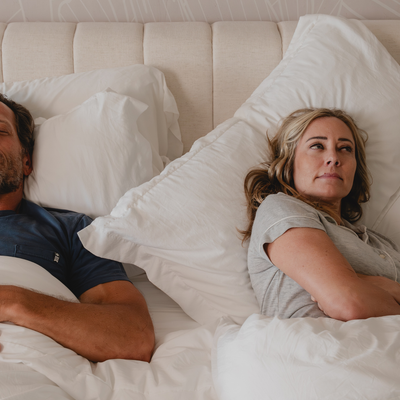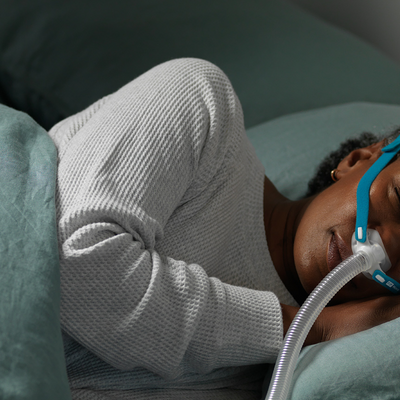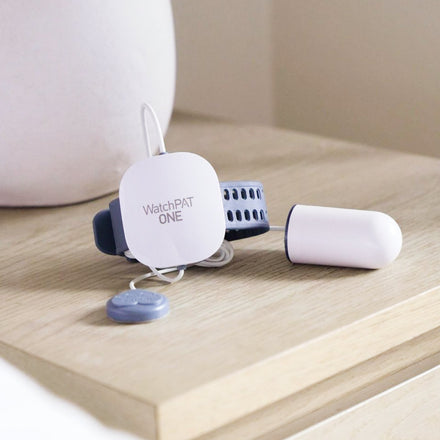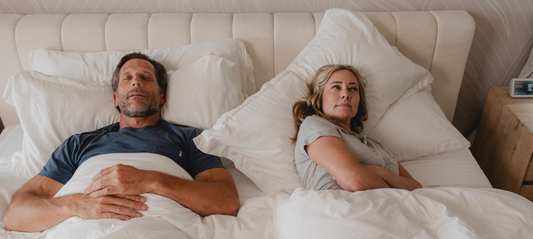We believe that sleep testing at home can be simple. For the hundreds of people suffering from undiagnosed sleep apnea, there’s an easier answer than expensive in-lab testing.
Testing for sleep apnea at home offers comfort and peace of mind to those who suspect they may be suffering from obstructive sleep apnea. Removing the need for wires, electrodes and surveillance by technicians allows more people to access the care they need, faster.
Start your journey with a Lofta at home sleep study
What is an At-Home Sleep Test?
Home sleep studies have been around for longer than you think. Wearable technology has advanced at a rapid rate. Since 2017, the American Academy of Sleep Medicine (AASM) has recognized that wearable devices can be used as home sleep study equipment and are suitable for determining if someone suffers from mild or moderate obstructive sleep apnea (OSA). An at home sleep study device gathers metrics related to peripheral arterial tonometry (PAT) and blood level oxygen, or oximetry, during sleep.
This technology has transformed the way practitioners can quickly and accurately diagnose those with sleep apnea, allowing many more people to begin the treatment they need for a good night’s rest.
CPAP testing at home can also be valuable in determining whether a patient has a more serious sleep disorder. That’s because inconclusive results may indicate something more severe, such as narcolepsy or central sleep apnea, which will then require further testing and treatment.
Sleep apnea and the need for treatment
Sleep testing at home can determine the presence of sleep apnea. For many people a bad night’s sleep or insomnia is just a fact of life, rather than an indication of an underlying sleep disorder. (Read about the difference between apnea and insomnia). This means that the symptoms that indicate sleep apnea go unnoticed or undiagnosed.
The following symptoms can all imply the presence of a sleep disorder:
- Chronic fatigue
- Snoring
- Waking up gasping for air
- Sore throat or morning headaches
- Memory loss
- Hypertension
- Heart disease
- Mood swings and irritability
- Metabolic disorders
Untreated sleep apnea can lead to extremely serious conditions, including increased risk for car accidents, strokes, and heart attacks, which is why quick, convenient sleep testing at home is crucial.
Do you think you have sleep apnea? Read more about sleep apnea related symptoms.
The reason for all these chronic conditions could be as simple as poor quality of sleep, and as easy to treat as using a CPAP machine.
How does testing for sleep apnea at home work?
When we sleep, our breathing shifts, and our bodies take in less oxygen as our muscles relax. However, for some people, these events become apneas or hypopneas, when little or no oxygen enters the system, often due to a blockage (such as muscles of the tongue or throat that relax when sleeping). This reduction in oxygen results in snoring, or gasping for air, when the brain alerts the body that no oxygen has been taken in, and the sleeper wakes up.
Learn more about what sleep apnea is.
Sleep testing at home can help detect the presence of apnea events during the course of a night.
Usually, the sleeper puts on a wearable device, such as a ring or a watch, which is worn for the duration of a night. This sleep apnea test machine then detects how many times the wearer stops breathing during the night.
Here’s more info on sleep apnea home tests
These results are then shared with the consulting healthcare practitioner, who can determine the presence of obstructive sleep apnea based on the following guidelines:
- 5-15 apnea events per hour is considered mild sleep apnea
- 15-30 apnea events per hour is considered moderate sleep apnea
- 30+ apnea events per hour is considered severe and may require further testing
Once the presence of sleep apnea has been determined, the sleep therapist can assist in providing a tailored sleep treatment plan.
Why choose a home sleep study vs an in-lab sleep study?
Sleep testing, or polysomnography, is classified into four types. The first two types are conducted in a sleep lab or clinic, require a prescription, and measure up to nine different metrics to determine underlying sleep issues. Type 3 and Type 4 are CPAP tests at home, and usually measure the sleeper’s heart rate, oximetry, airflow, and movement, depending on the level of the test.
While lab-based polysomnography is more thorough, having to spend the night in a strange environment is a barrier to entry for many people needing treatment for a sleep disorder. Unlike the Lofta at home sleep study, in-lab sleep tests can be invasive, expensive and can involve a long waiting period. Usually, the patient is connected to several electrodes, nasal cannulas, and a belt which measures breathing, airflow, movement and brain activity while sleeping. A technician is also on hand to monitor the process.
An at home sleep study device can be just as effective for diagnosing those with mild or moderate obstructive sleep apnea and does not entail spending the night in a strange location, which many feel may impact the results.
Instead, using a sleep study machine at home can simply form as part of your normal night routine and takes place in the comfort of familiar surroundings. As part of the test, you wear a simple sleep apnea test machine, similar to a smart watch or ring. This smart device will track relevant metrics during the night to share with your consulting practitioner.
What the results of at home sleep studies mean
Testing for sleep apnea at home can be very accurate when it comes to detecting the presence of obstructive sleep apnea. Once a Lofta sleep study has been completed, the consulting physician will be able to advise whether mild or moderate OSA is present. If central sleep apnea or severe OSA is suspected, the patient will be referred for further testing.
Should the CPAP test at home signal the need for treatment, it is likely that the consulting physician will prescribe Positive Airway Pressure (PAP) therapy. This usually takes the form of a CPAP machine, which provides the patient with continuous air pressure to keep their airways open throughout the night. An APAP machine does the same, except it adjusts the pressure automatically according to the sleeper’s patterns, while a BiPAP machine only provides two types of pressure settings.
The stigma around sleep apnea treatment is undeserved. CPAP, APAP and BiPAP machines, all of which are used to treat various types of sleep disorders, are more silent and more discreet than ever.
Why choose the Lofta Sleep Study experience?
Lofta is a prominent provider of at home sleep test technologies. We understand the challenges associated with undiagnosed sleep apnea and the impact it has on individuals' daily lives.
We are committed to transforming the lives of those affected by sleep apnea by offering accessible and user-friendly home testing solutions.
Lofta’s simple and convenient process:
- Have a telemedicine consultation with a healthcare practitioner
- Order your test
- Book a telemedicine consultation
- The consultation includes which test is right for you, how and when to take it
- Receive your wearable and take the sleep study test at home
- Your wearable device will be delivered to your door
- Download the companion app and follow the easy instructions
- Conduct your usual bedtime routine on the night of the test
- When you stop the test the next morning, results will automatically be uploaded and shared to your practitioner via the companion app.
- Receive a customised sleep report
- The results of your test are compiled into a tailored sleep report just for you
- If your results detect sleep apnea, you will be assigned a Lofta Sleep Coach
- The Lofta Sleep Coach will go through your results with you and get you started with a therapy package
- LoftaCare Option for Ongoing Support
- You will also be assigned a therapy coach who can help you get the most out of your CPAP therapy
Discovering whether you have sleep apnea is now a straightforward process. Begin your path to restful sleep by ordering a wearable home sleep test device through Lofta. Experience the positive change that comes with addressing your sleep apnea today.
FAQs
Q: Are home sleep tests accurate?
A: Yes, a sleep test at home produces accurate results. According to the American Academy of Sleep Medicine (AASM), at home sleep studies have been deemed a viable way to determine mild or moderate sleep apnea since 2017, when home wearable devices such as the WatchPAT, and now the SleepImage ring were considered accurate in determining whether a person suffers from Obstructive Sleep Apnea (OSA) by measuring heart rate and blood oxygen levels.
These markers are then interpreted by a somnologist or pulmonologist to determine the presence of sleep apnea. If they return inconclusive, it may indicate the presence of a more serious sleep condition, which would then require in-lab sleep testing.
Q: What are 3 symptoms of sleep apnea?
A: Three symptoms of sleep apnea include chronic daytime fatigue, loud snoring and waking up choking or gasping for air. There are other symptoms which may relate to undiagnosed sleep apnea, including mood disorders, metabolic issues and heart disease when left untreated.
Sleep apnea can impact every aspect of a person’s health and wellness, as organs are unable to operate adequately, impacting physical and mental health, and ultimately quality of life. If you suspect you have sleep apnea, testing for sleep apnea at home is a simple and convenient way to determine whether you do, and to begin a treatment plan as soon as possible.
Q: How many hours of sleep do you need for a home sleep test?
A: It is recommended to get at least seven hours of sleep to get adequate results from an at home sleep study device. However, if this is not possible, you are able to take the test more than once, and your consulting physician will be able to advise you whether you need to take the test again.
Q: Is Sleep apnea being under reported?
A: Yes, sleep apnea is a hugely underreported health concern across America, with a suspected 1 in 15 Americans suffering from this condition. According to the American Medical association, at least 80% of those suffering with sleep apnea have not been diagnosed.
In 2018, it was estimated that 10x more people are suffering from sleep apnea around the world than previously believed. This is because the symptoms of sleep apnea are assumed to be a normal part of sleeping, such as snoring or restlessness. With busy schedules and lifestyles, many people assume that the chronic fatigue and mood disorders they experience are associated with stress and overworking, rather than poor quality of sleep.
Q: Can I go to the bathroom during a sleep study?
A: If you are conducting a sleep study in a lab, you need to let the technician know that you need to use the bathroom, so that they can assist with removing the sensors and machinery that you are connected to. The room you are sleeping in should have a bathroom attached, as is the case with most hospitals or clinics.
If you are using an at home sleep study device, avoid consuming liquids one hour before sleeping, however, going to the bathroom is a normal part of your nighttime routine. If you need to use the loo, remove the device, and remember to put it back on once you return to your bed.
Q: Is it better to do a sleep study at home or in a lab?
A: CPAP testing at home will be able to accurately detect whether you suffer from mild or moderate Obstructive Sleep Apnea. A sleep test in a lab will be able to detect this too, as well as more severe sleep disorders like Central Sleep Apnea, Narcolepsy and Restless Limb Syndrome.
There are pros and cons to choosing either an at home or in lab sleep study, and as is the case with most things, comes down to personal preference. At home offers comfort and privacy, but may not detect severe sleep disorders, whereas in the lab will be able to detect these, but may take longer to arrange, and costs far more than a sleep study done at home.
Q: What happens if I can't sleep during home sleep study?
A: Conducting a sleep study can feel strange and may make you feel self-conscious about sleeping. Fortunately, because the device is used in the comfort of your home, you can usually conduct the same test across multiple nights, so if you can’t sleep or have a bad night, it shouldn’t impact your results. The consulting physician will also advise you whether the initial results are inadequate, and whether you will need to do the sleep test again.
Q: Is a home sleep apnea test cheaper?
A: Yes, a home sleep apnea test machine is cheaper, and more accessible than sleep tests in a lab, for most people. Many at home sleep tests are also covered by medical insurance, so be sure to check beforehand whether your medical plan can cover your purchase and virtual consultation.













































